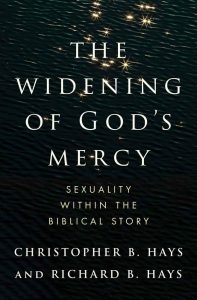I got all hot and bothered several months ago when I heard that Richard Hays (and his son Christopher) had finally published something reversing his silly Moral Vision of the New Testament chapter (published in 1996) in which he argued the Bible is against same-sex sexual activity but Christians should be nice to gay people.
Well, The Widening of God’s Mercy is out and I have a copy. I have read the parts that are best suited to my gossipy personality: the introduction and the last two chapters. The middle is mostly Bible stuff and since I have the same three letters after my name as them, I figured I could skim the chapters and get the gist.
Is there repentance?
When I heard about The Widening of God’s Mercy, I hoped it would contain “the most explicit and contrite repentance one can muster” from Richard for that chapter in Moral Vision and for taking so long to refute it.
 In the new book, the epilogue is where we find his statements of remorse and repentance: “For me, the change of opinion can be described as metanoia: a turning, a transformation of mind. In most of our English Bibles, that word is translated as ‘repentance.’ The word … points forward toward the transformation of thought and action.”
In the new book, the epilogue is where we find his statements of remorse and repentance: “For me, the change of opinion can be described as metanoia: a turning, a transformation of mind. In most of our English Bibles, that word is translated as ‘repentance.’ The word … points forward toward the transformation of thought and action.”
I see you, Richard! We’re Bible scholars. Of course we’re gonna give a Greek lesson while saying sorry.
Of his reasoning in Moral Vision, he states that “it was — to put it bluntly — the presumptuous judgment of an eager young scholar.” He goes on, “When I wrote that chapter, I was more concerned about my own intellectual project than about the pain of gay and lesbian people inside and outside the church. … The present book is, for me, an effort to offer contrition and to set the record straight on where I now stand.”
“The present book can’t undo past damage, but I pray that it may be of some help.”
On the last page of the epilogue he says, “I can only say to anyone and everyone who has been hurt by my words: I am deeply sorry. The present book can’t undo past damage, but I pray that it may be of some help.”
Lovely.
Public apologies are nearly impossible to get right and they rarely satisfy critics. Richard does an admirable job of saying he was wrong, acknowledging the hurt he caused, and admitting the change of heart was overdue. He manages all this without too much contextualizing so as to justify a bad take. There is some of that, of course. Who could resist?
Richard says, “Writing at a time when same-sex marriage was illegal in the United States and forbidden in nearly all Christian churches, I intended my chapter as an appeal for compassionate traditionalism.” You may recall that a good bit of the Moral Vision chapter was based on exchanges between Richard and his late friend, Gary, who was gay. Concerning that, Richard offers contextualization mixed with remorse, “My perception of homosexuality was very much shaped by his (Gary’s) experience and his testimony. Nonetheless, in retrospect, I fear that I was using him as a prop for my own theoretical construction.”
He ends his remarks with a communal prayer of confession and repentance from the Book of Common Prayer and then says, “I join with generations of faithful in praying that heartfelt prayer, recognizing that I, along with all God’s people, need God’s mercy. May we all walk in God’s merciful ways.”
“I know I can be petty and judgy, but that last bit did rub me the wrong way.”
I know I can be petty and judgy, but that last bit did rub me the wrong way. It felt a little #alllivesmatter-ish. Yes, we all need God’s mercy, but not all of us wrote a lousy chapter in 1996 and then took almost 30 years to publicly repent. See, I am judgy and maybe a little petty.
In all, I believe Richard’s apology epilogue is at its best when he keeps his own culpability in the forefront of his repentance vision. And he really does do that most of the time.
What about Fuller?
Anticipating the release of this book, I also did some musing on whether or not Christopher would be able to keep his job at Fuller Theological Seminary since the school has ousted other faculty members for saying far less on LGBTQ inclusion. I was surprised to find that Chris didn’t even try to fly under the institutional radar.
Instead, he takes Fuller on, describing Fuller’s narrowing (as opposed to widening) on LGBTQ inclusion in the past decade in the book’s introduction. He describes the Maxon case, a lawsuit brought against the school by students who were expelled for being in same-sex marriages. He cites a “celebratory email sent to the faculty when the Maxon case was decided in Fuller’s favor in 2021” as the impetus that “spurred me along toward writing this book.”

Richard B. Hays and Chris Hays
He goes on to describe a pattern at Fuller of adopting institutional standards on human sexuality that did not align with large swaths of faculty, staff and students. More recently Fuller has drafted a statement that “recognizes our denominational diversity by promising not to enforce community standards on students. It also cautiously affirms faculty academic freedom related to sexuality issues.”
Maybe academic freedom and denominational diversity will save Chris from termination. He happens to be ordained in the Presbyterian Church (USA), a denomination known for LGBTQ inclusion. Here’s hoping!
Who is this book for?
In the introduction, Chris also lets us know who this book is for. First and foremost, Chris and Richard write for the next generation. The book is dedicated to Chris’s daughter, Maddie, and all Richard’s grandchildren. Of this generation, Chris writes that they “will have no patience with debates over human rights for those whose sexual orientation does not conform to ‘traditional’ standards.”
“First and foremost, Chris and Richard write for the next generation.”
The book is written for a wide audience including lay people and ministers. It’s low on footnotes and high on engaging conversational prose. Chris says the book is for “some people who are still conflicted in their own minds about this issue and will be helped by the road map that this book lays out for understanding God” and also “for those who are already convinced that LGBTQ people are just as good as straight people but who are unsure about God and Christianity.”
The final chapter, titled “Moral Re-vision,” lays out the thesis/vision of the book, “The biblical narratives throughout the Old Testament and New trace a trajectory of mercy that leads us to welcome sexual minorities no longer as ‘strangers and aliens’ but as ‘fellow citizens with the saints and also members of the household of God.’ Full stop.”
Son and father develop this thesis in three parts. Chris tackles the Old Testament in part one, Richard the New Testament in part two, and then they both apply their findings to human sexuality in part three. The goal, for them, is to move away from the handful of biblical texts that “forbid or disapprove of same-sex relations” by zooming out to the Bible as a whole.
Paramount to their argument is that the Bible presents God as dynamic rather than static, adaptable and eager to extend mercy to those who once were considered outsiders. On the basis of God’s adaptability, the Hayses urge Christians to adapt. They imply that, although there are biblical passages against same-sex relationships, God has changed and now embraces them just like God has done for eunuchs and Gentiles, saying, “It seems to us that God is moving on again, whether we like it or not.”
I’m tempted to throw a fit, demanding that they admit that God’s mercy always has embraced eunuchs, Gentiles and queer folks. However, that would be demanding that they revise how they’ve argued the case just because I wouldn’t do it this way. When you’ve been trained as a biblical scholar, it’s difficult to make claims about God. That’s the work of theology. We can tell you what the Bible says about God much more easily. Perhaps that’s what is going on in The Widening of God’s Mercy.
Is it fresh?
Advertising for the book promises “a fresh, deeply biblical account of God’s expanding grace and mercy.” Is that what we got? It’s true that they take an expansive view of the whole Protestant Bible. How handy to have a father/son duo that can tackle both parts of the Protestant canon!
It’s also true that they make a biblical case for God’s expansive mercy. Is it fresh?
Scanning the chapters and endnotes, the biblical scholarship was recognizable to me. It reads as white, straight and male. I recognize it because it’s precisely the kind of scholarship I was trained to do by white, straight men. I’m not aiming to be critical, merely descriptive. There aren’t many people of color in the citations (although there are some!) and queer voices, queer theory, queer theology and queer biblical interpretation are largely left out. Richard cites himself frequently, which is a classic guy-scholar thing that cuts down on diversity.
“I recognize it because it’s precisely the kind of scholarship I was trained to do by white, straight men.”
In my mind, what the book delivers is a heartfelt repentance and apology from Richard for that Moral Vision chapter. I’m grateful. Chris gives us a straight, white guy who is willing to defy institutional power because he’s “done being safe while many others are not.” I can respect that. The book also brings us some top-notch straight, white, male biblical scholars who explain the biblical text in ways most folks can understand. Is it fresh?
Look, they didn’t write this book for me. I’m a straight, white, suburban mom with a terminal degree in biblical studies who has been trying (imperfectly) to be an ally for a while. I’m neither undecided nor uniformed. I also have those protective mom instincts that make me want to rage and scream and burn down every vestige of heteronormative patriarchal nonsense, because it hurts vulnerable people who I want to see empowered. The book is not big on rage-filled passion.
In the final chapter, the Hayses admit their argument will not sway everyone. But they urge, citing Romans, that we provide “grace and forbearance toward those with whom we disagree” and “welcome one another.” They maintain: “It should remain possible for churches with different beliefs and practices to coexist peaceably. … This is not because the issues of sexuality are insignificant. Instead, it is because a church that cannot find more urgent issues than the sexuality debates, given the present state of our faith in the world, is probably not very interested in being the church of Jesus Christ at all.”
I think they have nonaffirming churches and individuals in mind as they call for peaceful co-existence here. I think they want nonaffirming churches and individuals to chill and just drop the debate and hand wringing. But when I read the words as applying to me, my mom-rage kicked in and I thought, “absolutely not.” I don’t want to get along with or welcome Christians who don’t believe in the full humanity and belovedness of my queer siblings. I don’t agree that there are more urgent issues in the church than screaming and howling and fighting for the inclusion of the marginalized. I’m pretty dogged and unable to be reasoned with on those scores.
Is it fresh? It’s fresh like a dad getting a new pair of white New Balance sneakers is fresh. This book does not give rage, it does not give colorful, it does not give queer. But it does give another tool to use in the fight for justice.
And despite my sometimes uncharitable reactions to it, I’ll take it and say thank you to the authors. I think it provides what it promises to those for whom it was written.

Anna Sieges
Anna Sieges serves as associate professor of religion at Gardner-Webb University in Boiling Springs, N.C. She loves shopping, discussing the Bible and romantic comedies. The opinions expressed here are her own.
Related articles:
An oft-quoted biblical scholar changes his mind on LGBTQ inclusion in the church | Opinion by Anna Sieges Beal
The Widening of God’s Mercy: A reflection | Opinion by Brandan Robertson
What to expect from The Widening of God’s Mercy | Analysis by Karen Keen


